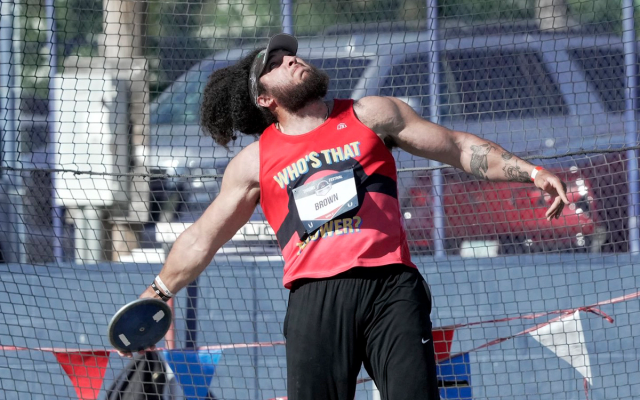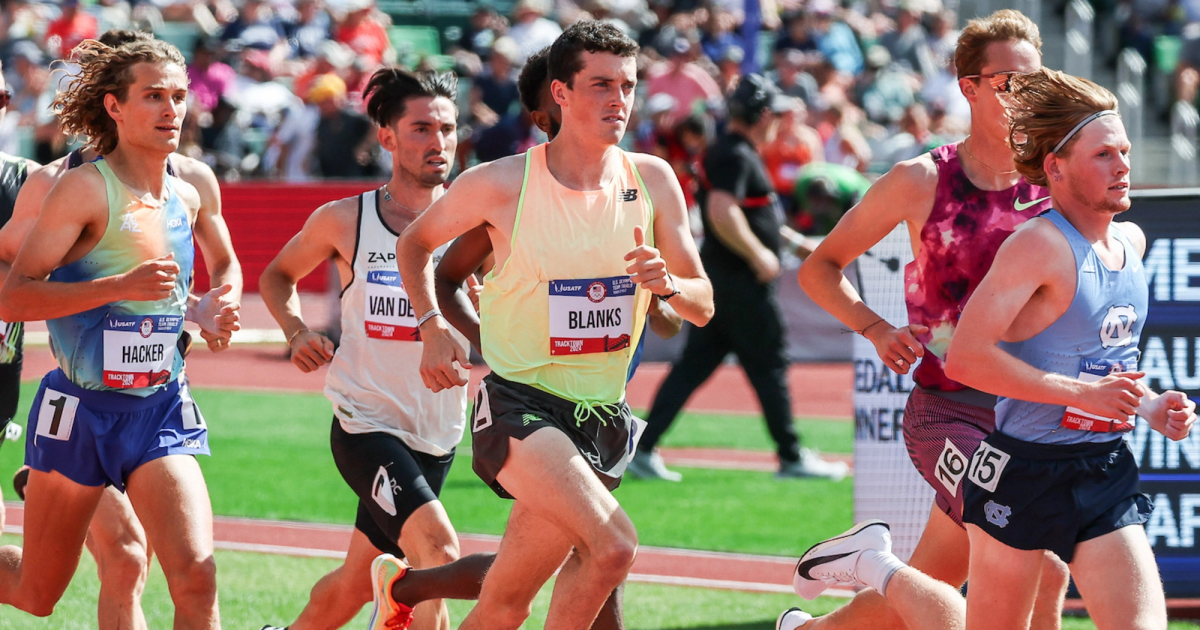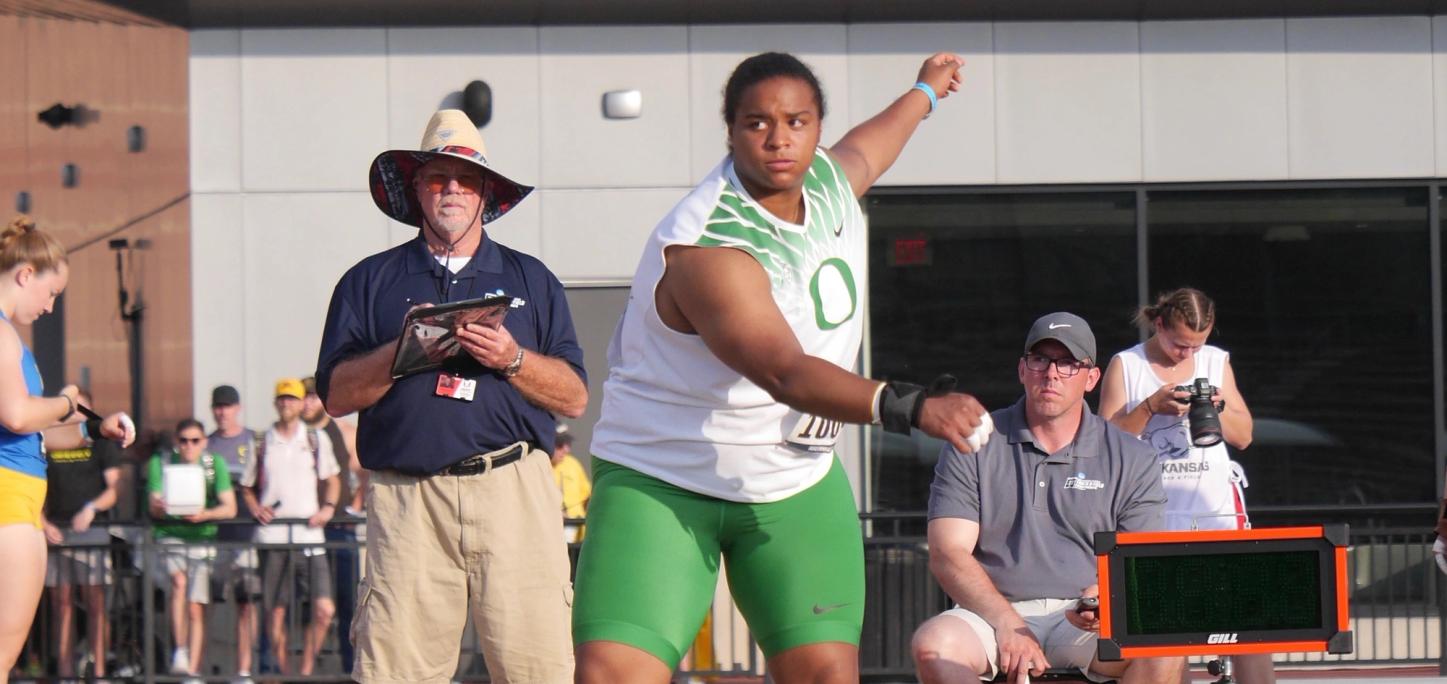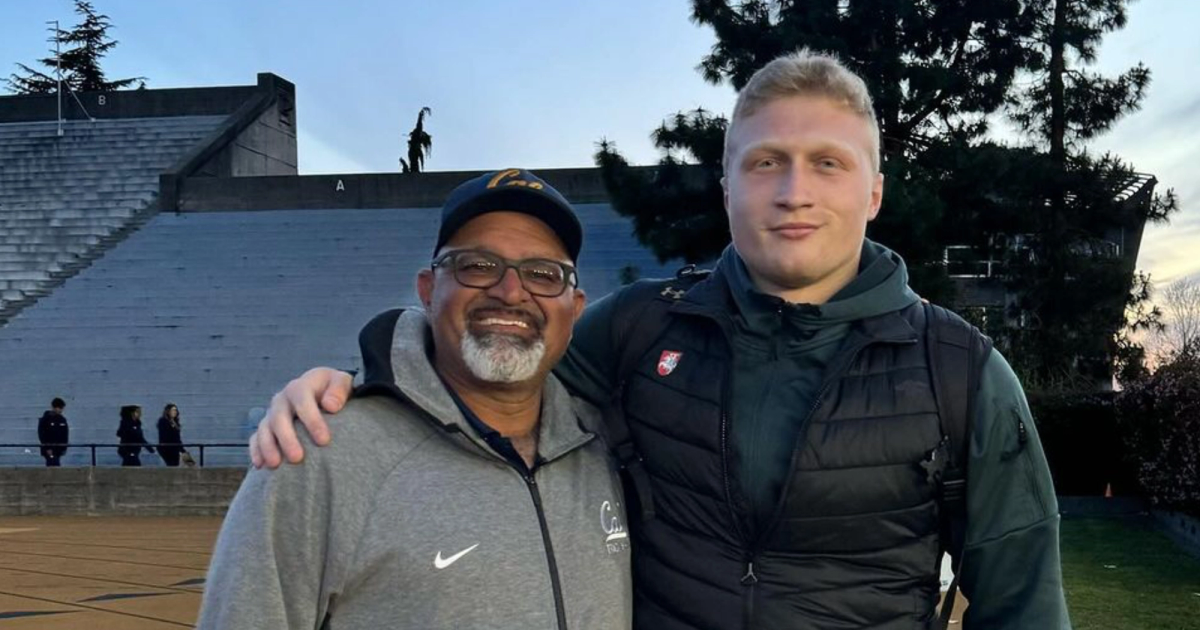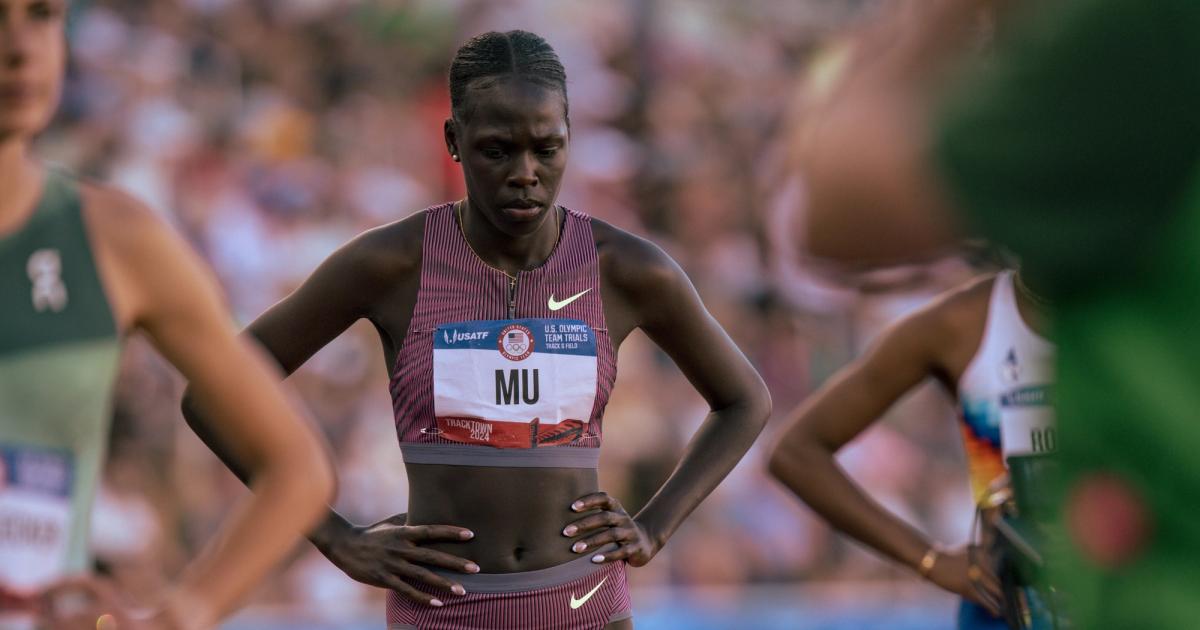By Paul Hof-Mahoney
July 10, 2024
On June 29th, Joe Brown punched his ticket to Paris with a sixth-round effort of 65.79m to finish third in the men’s discus at the U.S. Olympic Trials. In doing so, Brown secured a spot on his first major championship team, and the moment served as the culmination of Brown’s professional journey since graduating from D2 Texas A&M-Commerce in 2019.
We sat down with Brown this weekend to break down one of the best discus competitions in U.S. history, discuss his career as an unattached thrower, and his outlook for Paris.
CITIUS MAG: Joe Brown, Olympian. Has that title sunk in yet?
Joe Brown: I don’t think so, no. It hasn’t really sunk in yet, this still doesn’t feel real.
Let’s go back to that competition last Saturday. One of the best American discus competitions ever, and you only got into the top eight by 3cm. You were at 61.58m to 61.55m after three rounds. What were the emotions like heading into the finals after just barely getting in?
It was intense, it was every emotion you could think of. I was feeling nervous, anxious, happy, sad, all of them. After the [61.55m] in the second round, that’s when I started getting worried. I thought that wasn’t enough, and that’s when I started having the thoughts of, “Ugh, is that all I have today?” Because that one didn’t feel like the throw I was looking for. It had a decent release, but I didn’t know if I’d be able to get any higher.
The third round one [60.66m], I was like, “Oh no, this is not where I want to be sitting.” I knew every one of the guys below me could definitely jump above me at any time. I was just waiting for them to do it. I was sad for them, because they’re my friends, like Dallin [Shurts] and Jeff [Williams], all those guys. It hurt being the one where it was either me or them. So that part sucked, but I was relieved when I made it.
And you were first in the order, right? So you had to wait for literally everyone to go through?
Yeah, every single thrower.
Then we get to round six and you’re still sitting in eighth, but you go 65.79m. You move into third, ahead of Reggie Jagers by 4cm, and then you’re playing the waiting game again. When that throw came out of your hand, how did it feel? It was your best throw on the day by a pretty significant margin, did you know that you at least put yourself into contention for top three on release?
No, it didn’t feel good, I didn’t think it was a good throw when it came out. I felt where I was at when I came through on my reverse, and I came through on the left side of the ring. I thought that meant I over-rotated, and a lot of times when I over-rotate it’s just not very good.
I felt the edge of the ring when I came through on my reverse, and I felt my ankle buckle. I was like, “Oh no, I almost fouled.” So, there were so many things that went wrong on the throw, and I thought it might’ve been a little bit further but I didn’t think it was far enough. But then I came around and watched land and realized, “Oh, I think that was past the tape. I guess that’s pretty good.”
I was walking out thinking that I don’t know where it’s gonna be, but that’s all I had. I was looking at the board and I saw the numbers pop up and it was better than I thought it was. And then I saw the place, and I was like, “Hmmm. Third place.” It took a while to register in my head that I think we’re in. And then I just started screaming, but I had to calm down because we’ve still got all of the rest of the guys to go. And that part was excruciating.
Were you able to watch the last few throws at all or did you have to look away and not pay attention to them?
At that point I just knew there was nothing I could do, and I was already having a panic attack on the field, so there was no more I could give. I was talking with Marcus [Gustaveson], and before he threw he came over and congratulated me, and I don’t even remember what we were talking about. I blacked out at that point.
I didn’t want to watch anybody throw. I knew Turner [Washington] could throw farther, because that’s his thing, coming back and answering people. I knew Brian [Williams] could do it because Brian’s the one that sniped me last year at USAs. Every one of them could. I was cheering for all of them, if I can remember correctly, but I was cheering and looking away at the same time because I didn’t want to see where it landed.
When you finally saw Reggie Jagers’s last throw come up as a foul, did it all hit you in that one moment that you got the job done, finished top three, heading to Paris? Or was it more of a gradual realization?
That’s when it all came crashing in. I was standing with Marcus at that point and he asked me, “How’s it feel?” and I told him, “I think I’m struggling to breathe, I think I’m having a panic attack.” He said he’d be here to catch me if I passed out, and then I went down into a crouch while I was trying to breathe and he was like, “Oh, you’re serious? It’s okay, you’ll be okay.” It was all coming in, and the adrenaline was still rushing, and all of it was just crashing at the same time.
How much of a relief was it knowing you had the Olympic standard locked up and didn’t have to sit and wait for any World Rankings math?
That was super nice. I feel like it put more internal pressure on me, because I knew I had already thrown pretty far this year. I needed to be able to repeat it. I know if I do what I’m capable of doing, then I can make the team. So in my heart and in my head, that made me more anxious. I had a lot more energy and nerves going into it than any previous competition.
I saw an interview you did in the mixed zone with Throws University post-meet where you said that you were seriously considering retiring if you didn’t make this team. With the quality of the field, there was a possibility you could throw 67m and still finish outside the top three. Even if you would have performed that well, was it “Olympic team or bust” for you this year?
Yeah, that’s how I was feeling. Like I said, in my heart and in my head I felt like it was within my capabilities to get at least top three. If I didn’t get in the top three, to me that was a sign that I’m just not cut out for big competitions, so I was just gonna call it.
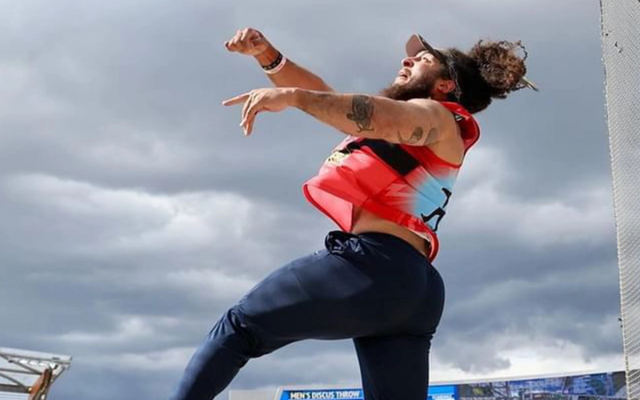
Chuck Aragon / @chuck_aragon
Let’s get into a little bit of your journey to get where you are now. Going back to the very beginning, how did you get into the sport?
I started in seventh grade, and I got into it just because I wanted to work out in school and be part of the athletics class. My brother and dad were always working out and doing cool stuff, and I would just tag along. So I knew about the athletics class because of [my brother], but I didn’t want to play football, I didn’t know anything about football, but that’s the number one thing in Texas. I wasn’t good at basketball, so one of the only other choices was track.
First day of practice, we did a workout that was sprint the straights and do lunges on the curves, and I just knew that wasn’t for me, I don’t think I can do this. Eventually I made my way over to the throws somehow, and I was not good. I threw it over the net one time and into the tennis courts while they were practicing. I don’t think I hit anybody, but that was one of the things I remember most about that time.
I didn’t go to any meets in seventh, eighth, or ninth grade, I wasn’t good enough to throw in any meets. The first meet I ever went to was in tenth grade, and I was decent but I wasn’t good. I did start playing football in high school, and I did track during the off-season for another sport.
I never really got that great in high school. Compared to everyone else that I throw against now, most of them threw probably 40-50 feet farther than me, or they were state champions and state runner-ups. I didn’t even make it to the state championship meet.
I wanted to go to college for football, but I didn’t get very many offers. Then I started emailing coaches myself and asking if they needed a thrower on their team. I reached out to A&M-Commerce and that’s where I ended up. Got a little scholarship, but it was pretty close to being a walk-on basically.
So now you’re at D2 Texas A&M-Commerce, and in 2019 you win the NCAA D2 National title. What was that experience like for you?
That was vindicating to me, is a good way to describe it. I was never the favorite, always the little guy, the smallest person in the field. I wasn’t even the best on my own team, I wasn’t the one people on our own team would’ve picked to win. It validated my belief in myself, that was the best part of it.
That whole year was when I started taking meditation, mindfulness, visualization and mental training a lot more seriously. I had visualized winning the D2 championship over and over and over again. Every time anyone asked me, I told them that’s what I was planning on doing, and every time they’d be like, “Oh okay, but what about Josh [Boateng, Brown’s teammate]?” When we got to the competition, it felt natural to me. It felt like I had been there, I felt like I was just doing what I had planned on doing. I was just going through the steps I planned out in my head.
I don’t think I had many nerves going into that meet. I was thinking about this the other day, I can't remember feeling anxious or nervous or anything going into that one. I had done so much mental preparation for that day. I knew what I was there to do, and it played out exactly how I had planned. And that was so cool, because I was like, “I can’t believe this works, this is crazy! I can’t believe that the mental training and my beliefs paid off.” It ignited the fire in me that maybe this dream isn’t as far away as I think it is.
How important would you say that meet was to your decision to continue throwing post-collegiately?
It wouldn’t have happened if I didn’t win that. I didn’t know anything about competing post-collegiately, and I didn’t even understand the U.S. National Championships. After NCAAs, my coach said that we should try and get me into the national championship, and I was like, “Okay, what is that? I thought we just competed at the national championships.” He just said, “No, the big one.” So we entered, but I was tied for the last spot and they ended up taking the other guy instead. But I had been getting better every year, so I might as well keep going.
The next year I became a [graduate assistant] with the team, so it was a pretty easy transition, but I also lost my coach because he retired. I didn’t really have anyone guiding me, so I kinda had to figure everything out on my own.
I know we talked a little bit about you potentially stepping away from the sport if this meet didn’t go well, but were there times in 2021, 2022 or 2023 where you looked at retirement as a serious option?
Definitely. Coming into the ‘21 Trials, I didn’t have a big PR, but I had just hit a PR going into it, I had just broken 60m. In the weeks leading up to it, I was throwing the best I ever had in my life, throwing 62m and 63m pretty easily, so I thought I had a shot. When I got to the meet, I don’t know what happened. It just became way bigger than I thought it was. The moment was too big for me. I threw 53m, got dead last, didn’t even make it to the final. 63m ended up winning, and that’s what I was throwing in the weeks leading up to it.
At that point, I wasn’t making any money, I didn’t have any money, I didn’t know if I could do this. I didn’t know if I should keep doing this, like are we gonna be able to live? I had lost my GA position, so I didn’t have a job. I was questioning everything. I didn’t have a coach, I didn’t have a job, I didn’t have an agent, I didn’t have anything, and I just got last at the Trials. I had to think if it was even worth it for me to keep going.
I talked with a few people and that re-ignited my fire. I reframed the whole situation as more of a motivating thing so show me that I could’ve won that meet. That helped me see that I’m not that far away from where I want to be, I just need to be able to perform at these big meets.
In your post-collegiate career, you’ve been largely unsponsored. You have a partnership with TrackBarn, and the Texas Throwers Camp helped sponsor your trip to these Trials, but what have been some of the hardest things about competing unsponsored or unattached the last couple years?
One is kinda like a recognition thing. It makes you doubt your worth, thinking like, “Why don’t these big companies think that I’m worth it?” So it makes you doubt yourself a little bit. Also, you just have to pay for everything. I wouldn’t be able to do any of it without my wife, because she’s basically my sponsor, she pays for everything and allows me to keep on doing this hobby of mine. If I didn’t have her, I wouldn’t be able to go to as many meets as I did, get hotel rooms and pay the entry fees. The hardest part is just travel.
Equipment is one of the only things I haven’t had to worry about my whole career. Magically, somebody always has a pair of shoes for me somehow, and then TrackBarn always takes care of me with implements, so I’m really lucky with that.
Your progression has been incredible over the past few years. In 2021 you threw 60.18m, 62.62m in 2022, 63.55m last year, and now 67.92m. Can you talk a little about what’s gone into your somewhat of a “later bloom” in comparison to some of the other top throwers in the world?
In the last four weeks of my high school career, my progression was from like 120’ to 158’, and I didn’t throw that until my very last competition. So I had a really rapid progression in that short amount of time, and then I just kept up with that progression when I got to college. Even though I didn’t have an all-star coach, I had more resources, more people around me, I had YouTube. I had a lot more people who knew about throwing, so that progression just kept on going.
In college, I progressed almost two meters every year. After that, it’s been pretty much the same progression, just about two meters every year still. Since I got out of college, you would think it’d get harder to make that progression, but I think I’ve had more full healthy years since I got out of college. It was injury after injury when I was in college, and I don’t think I really ever had a full year of healthy training. That’s probably the biggest factor, along with being able to take off when I need to because I write my own training.
Are you entirely self-coached right now?
Yeah, I would say that. I have a couple people I consult with from time to time, but there’s nobody at my practices every day or who I send videos to consistently. Maybe once every couple months I’ll send videos to a couple people and see what they think are the best things I could fix with my technique. I’ll get a bunch of different opinions that way and see what the commonalities are between people’s opinions, and if it lines up with the way that I view my throw.
A lot of your progression in the last two years in particular have come in Ramona, Oklahoma. I feel like you should be the mayor of Ramona at this point because you compete there more than anyone else does. Could you talk a little bit about how important what Don Millican and Caleb Seal have done there is for the throwing community, having a dedicated throwing facility like that?
I think that’s the biggest thing for me, like I don’t even care about the wind. I just like going there because it’s throws only, they care about the throws, they treat us right, they accommodate to the athletes, and they have a million meets throughout the whole season. It’s pretty cheap to get there, pretty cheap to stay over there, and they’re just nice people. Everyone is always saying, “Oh, he’s chasing the wind, he’s chasing the standard.” I wasn’t chasing anything. I was competing there because I like them and I like competing.
I went there so much because they had the most opportunities to compete, and I liked using the competitions as my training. That helps you solidify that competition throw, because it’s hard to replicate that in practice by yourself. So having somewhere so close to me where I can drive up, spend the night, and get two competitions in, and they’re nice to me, it’s a win-win.
Do you think that after everything we saw this year, we could see bigger and deeper international fields coming out to Ramona next year?
Yeah, I think this year was a stepping stone of bigger things to come. There’s lots of possibilities for a lot of cool things to happen because of the magnitude of what happened there. There’s a lot more eyes on their facility and a lot more people are talking about it, so the possibilities are endless. Especially with Michael Johnson’s track league going on, we have the foundation over there to set something up for a field league, we just need the right people to get in contact with each other and make something happen.
You are incredibly active on social media, whether it’s posting workouts, lifting videos, or almost every competition you compete in. Is that something that was very natural for you, or is your social media presence something that you’re doing intentionally to hopefully have throwing reach more people?
It was not a natural thing. My wife is a social media person, that’s where she makes all her money from, so that’s what inspired me to get more involved. I saw her success with it and thought maybe I should give it a try. I could reach more people and use it to try and inspire more kids, answer people’s questions and talk about things that I don’t see people talking about. I just wanted to give a real perspective of what it’s like to be a post-collegiate thrower and just show everything, not tailoring it to make me look good.
You mentioned earlier how you’re pretty big on the mental side of things and visualization. What will the next couple weeks look like for you as you’re heading to the biggest stage the sport can possibly offer and it’s your first time at a competition of this magnitude?
Pretty much a continuation of what I’ve been doing. I’ll have some dedicated mindfulness sessions where I’ll do a body relaxation, and then I’ll do some visualization. I’ll put myself in the stadium with all the crowd noise, try to put myself in the situation and see how my body reacts. Then I try and visualize hitting the throw I want to hit and doing that consistently, being able to work through the finish and all the little things I want to get right.
Then it becomes trying to do the things I was just doing in my head in practice, and kinda pair the two together in real life. So when I’m in practice, I’ll do a couple of visualization reps and think about the venue I’m gonna be in, try and imagine all the noise.
I’ll also do a lot of competition reps in practice, where I’ll try and hit the positions I want to hit at really high intensity. I can get pretty high energy, and then I’ll probably do a couple competitions where I take some caffeine and get myself up as high as I can be and see if my technique holds.
Do you have any competitions on the schedule before we get to Paris?
I’m actually going to Oklahoma this weekend, I’ve got two competitions there.
Thank you so much for your time Joe, and best of luck in Paris!
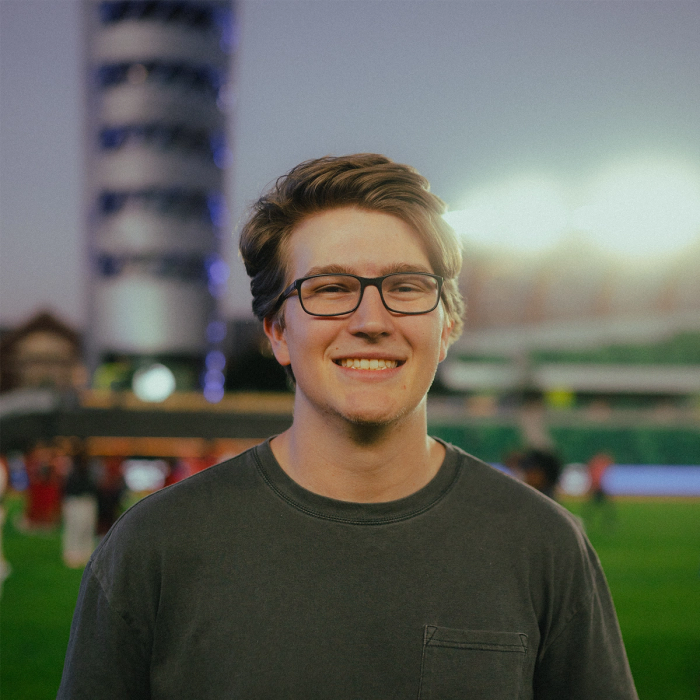
Paul Hof-Mahoney
Paul is currently a student at the University of Florida (Go Gators) and is incredibly excited to be making his way into the track and field scene. He loves getting the opportunity to showcase the fascinating storylines that build up year-over-year across all events (but especially the throws).
